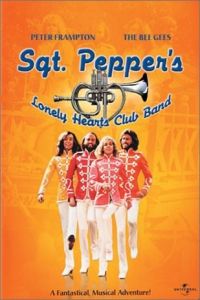
Sgt. Pepper's Lonely Hearts Club Band (1978) / Musical-Fantasy
MPAA Rated: PG for mild language and a scene of drug use
Running Time: 113 min.
Cast: Peter Frampton, The Bee Gees (Barry GIbb, Maurice Gibb, Robin Gibb), George Burns, Frankie Howard, Paul Nicholas, Donald Pleasance, Sandy Farina, Diane Steinberg, Steve Martin, Aerosmith, Earth Wind and Fire, Alice Cooper, Billy Preston, Stargard, Peter Allen (cameo), George Benson (cameo), Keith Carradine (cameo), Carol Channing (cameo), Jose Feliciano (cameo), Leif Garrett (cameo), Heart (cameo), Nona Hendryx (cameo), Etta James (cameo), Curtis Mayfield (cameo), Peter Noone (cameo), Robert Palmer (cameo), Wilson Pickett (cameo), Bonnie Raitt (cameo), Helen Reddy (cameo), Minnie Riperton (cameo), Chita Rivera (cameo), Sha-Na-Na (cameo), Del Shannon (cameo), Connie Stevens (cameo), Tina Turner (cameo), Frankie Valli (cameo), Grover Washington Jr. (cameo), Hank Williams Jr. (cameo), Wolfman Jack (cameo), Bobby Womack (cameo), Andy Tennant (cameo), George Harrison (cameo), Paul McCartney (cameo), Linda McCartney (cameo)
Director: Michael Schultz
Screenplay: Henry Edwards
Review published May 21, 2006
